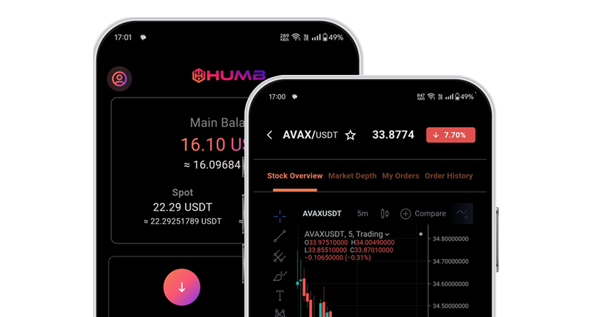HUMB � Revolutionizing the Healthcare Industry through a Dedicated Healthcare Token Exchange
Traditionally, healthcare data has been siloed within disparate systems, hindering interoperability and limiting patients' engagement in their own care. However, with the advent of innovative technologies, particularly blockchain and tokenization, there is a growing movement toward democratizing health data. This transformative approach envisions patients as active participants, allowing them to tokenize their health records securely on a blockchain. By doing so, individuals gain the ability to control who accesses their data, fostering transparency and privacy. The democratization of data not only enhances patient autonomy but also facilitates seamless collaboration among healthcare providers, researchers, and insurers. Patients become key stakeholders, able to make informed decisions, participate in medical research, and even monetize their health data in a secure and transparent manner. Ultimately, the democratization of healthcare data holds the promise of creating a more patient-centric, collaborative, and efficient healthcare ecosystem.
The healthcare industry, characterized by its complexity, high stakes, and vast amounts of data, has long faced challenges related to data management, security, and efficiency. Traditional healthcare systems often struggle with issues such as fragmented patient data, interoperability barriers, and regulatory compliance. These challenges have hindered innovation, impeded patient care, and increased costs.
Today the healthcare industry is at the cusp of a transformative revolution, driven by digital innovation, data-driven decision-making, and the rising importance of patientcentric care. Digital transformation also brings new outlook to revolutionize the way healthcare is delivered, managed, and financed. One of the most promising transformation in this space is the integration of blockchain technology and the concept of tokenization to help drive use-cases
Importance of Tokenization
Tokenization, which involves representing real-world assets as digital tokens on a blockchain, offers numerous advantages in terms of data security, interoperability, and transparency and has the potential to address several critical issues within the heal thcar e ecos y s tem. Tokens , as digi tal representations of assets or data, will offer a new way to manage and exchange value within healthcare. They can represent anything from patient health records to medical research funding.
HUMB - Dedicated token exchange platform
To fully harness the power of tokens in healthcare, there is an essential need to have a dedicated healthcare token exchange platform for the healthcare industry. This has led to the creation of HUMB – Healthcare Unified Medical Blockchain a token exchange platform dedicated for the healthcare industry. HUMB will still cater for the traditional tokens, but its Challenges faced by Healthcare Industry Importance of Tokenization HUMB - Dedicated token exchange platform focus will be on healthcare tokens. HUMB not only aims to revolutionize the future of healthcare by facilitating secure, efficient, and transparent token-based transactions but also addresses a number of critical issues in the healthcare industry while maintaining strict control, privacy, and consent standards improving the overall quality of care and fostering innovation.
HUMB tokenization exchange helps healthcare token creators to advance their use-cases in converting sensitive patient data into secure tokens, which are essentially unique, random, and non-reversible representations of the original data. These tokens can be used in various healthcare processes, transactions, and systems while preserving the privacy and security of the underlying data.
HUMB tokenisation process is extremely simple and robust
• Data Collection: The process begins with the collection of sensitive patient data, such as medical records,
• Tokenization: Next, this data is passed through a tokenization system or algorithm. The system generates tokens that are unique to each data element, such as a patient's name, social security number, or medical condition.
• Storage and Usage: The tokens, rather than the original data, are stored in various healthcare systems, databases, and applications. These tokens can be used for identification, billing, research, and other purposes.
• Mapping: A secure mapping or reference table is created that links the tokens to the original data. This mapping is stored in a highly secure environment.
• Tokenized Data Handling: When healthcare professionals, researchers, or other authorized parties need access to the data, they use the tokens. The tokenization system retrieves the corresponding original data from the mapping, allowing authorized access.
Benefits of Tokenization
HUMB drive for healthcare tokenization use-cases brings along with it potentially a number of other benefits for the Healthcare industry such as -
Enhanced Security: A high level of security for tokenized healthcare data is essential to establish trust in patients, healthcare providers, and stakeholders. Tokenized data is essentially meaningless without access to the mapping. HUMB ensures that sensitive health information remains confidential, maintains patient privacy, and reduces the risk of data breaches, ultimately contributing to the safe Benefits of Tokenization and responsible use of healthcare data for research, treatment, and analytics. Even if the tokens are intercepted, they cannot be reverse-engineered to reveal sensitive information.
Privacy Preservation:Patients or other stakeholders can rest assured that their confidential health information is protected, as the original data remains hidden from view. Tokenization helps healthcare organizations comply with data privacy regulations like HIPAA.
Data Sharing:HUMB facilitates tokenized data sharing among healthcare providers, researchers, and insurers while mitigating privacy risks. Authorized parties can access necessary information without exposing sensitive details.
Research and Analytics:HUMB enables global advancements in medical science and healthcare outcomes by making available tokenized data for statistical analysis and research purposes without compromising patient privacy, to researchers across boundaries.
Reduced Data Theft Risk:Tokenization reduces the attractiveness of healthcare records to cybercriminals since the tokens alone hold no intrinsic value. Even if tokens are stolen, they cannot be exploited without access to the mapping.
Streamlined Processes:Healthcare organizations can streamline operations like billing, insurance claims, and patient identification using tokenized data, enhancing efficiency.
Tokenization - A bonus for data owners
Want more? HUMB’s listed tokens are a bonus for the data owners, which typically can be different stakeholders from healthcare industry. Using HUMB listed token’s use-cases for healthcare records comes with several advantages for data owners such as:
Enhanced Privacy:Tokenization assures stakeholders that their sensitive health information is protected. Even if a breach occurs, the stolen tokens are of little value without access to the mapping.
Control:Data owners retain control over who can access their healthcare records and for what purposes. They can grant or revoke access as needed, contributing to data autonomy.
Compliance:HUMB will help healthcare providers and organizations comply with strict data privacy regulations like HIPAA or GDPR. Stakeholders can trust that their data is managed according to these standards.
Data Sharing:Consent: Stakeholders may be more willing to consent to data sharing for research or treatment when they know their data is tokenized, reducing privacy concerns.
Peace of Mind:Knowing that their data is tokenized and secure provides peace of mind for healthcare stakeholders, encouraging them to engage more actively in different healthcare initiatives and collaborations.
Faster Access:HUMB can facilitate quicker access to accurate healthcare data as tokenized data can be retrieved more efficiently than data stored in disparate silos. This efficiency is particularly valuable in emergency situations when quick access to healthcare information is critical, potentially saving lives.
Data Exchange Advocate
At the forefront of healthcare interoperability, HUMB’s listed tokens coupled with HUMB’s API that bridges the crypto-world with the real-world, pioneers the seamless exchange of data. It dismantles silos, encourages collaboration, and sets new standards for how healthcare information flows, securely and transparently. Connecting healthcare institutions worldwide, and fostering collaboration, HUMB aims to create a united front against global healthcare challenges.
Conclusion
All said and done Tokenization is emerging as a powerful tool for digitizing and standardizing assets for different industries. Especially for the healthcare industry, it offers a versatile means of representing everything from patient data to pharmaceutical products as digital tokens. These tokens can be traded, exchanged, and accessed securely, opening new possibilities for the healthcare industry. The healthcare sector faces longstanding challenges related to data fragmentation, security, interoperability, inefficiencies, and transparency. Dedicated healthcare token exchange platform like HUMB has the capacity to address these challenges head-on. HUMB’s listed tokens will enable a secure, interoperable, and efficient exchange of healthcare assets while maintaining data privacy and regulatory compliance and the potential to help break down data silos by enabling secure and standardized data exchange while preserving data privacy and security.
HUMB IS HERE TO DIGITALLY DISRUPT THE HEALTHCARE INDUSTRY!!! The journey has just begun, and the possibilities are boundless.





